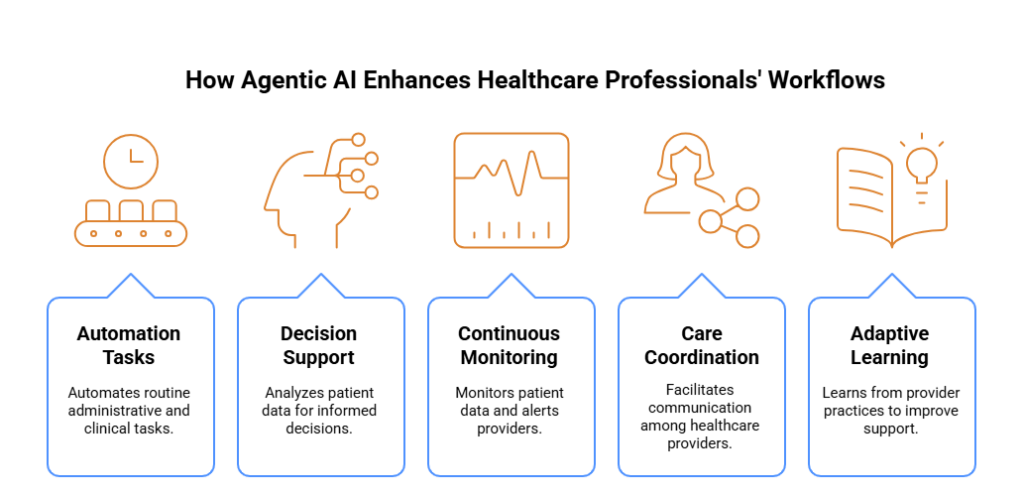Healthcare industry faces unprecedented data challenges, with providers managing 1.2 billion clinical documents annually and medical knowledge doubling every 73 days. Traditional AI systems no longer suffice in this rapidly evolving landscape.
Agentic AI represents the next frontier in healthcare innovation—systems that function as autonomous, goal-oriented partners rather than passive tools. These advanced AI systems can understand objectives, plan appropriate actions, adapt to changing circumstances, and execute complex tasks with minimal human guidance.
According to Software Advice’s 2026 Medical Software Trends survey, healthcare’s AI moment is building fast. 49% of providers say their expectations for AI have risen in the past year alone. But current usage tells a different story, with only one in three practices (33%) having adopted AI-powered medical software. Among early movers tracking impact, 88% report positive ROI, with clinical decision support emerging as the area where providers expect AI to make the biggest difference (52%).
This blog explores how Agentic AI is revolutionizing healthcare through autonomous decision-making capabilities. We’ll examine emerging clinical applications, discuss the technological breakthroughs enabling this transformation, and explain why Agentic AI represents a fundamental paradigm shift in healthcare delivery rather than merely incremental progress.

How Does Agentic AI Enhances Healthcare Operations?
In healthcare settings, Agentic AI helps transform how providers deliver care. Agentic systems can simultaneously monitor multiple patients in intensive care units, alerting staff to deteriorating conditions before traditional monitoring systems detect problems. They can also analyze imaging data in real-time during surgical procedures, aiding surgery with imaging data and helping the surgeon identify critical structures and avoid complications.
In chronic disease management, Agentic AI can iteratively adjust treatment plans based on how patients respond to medication, environmental circumstances, and new findings from studies, delivering personalized care that evolves with the patient.
Drive Business Growth and Efficiency with AI Agentic!
Partner with Kanerika for Expert AI implementation Services
The Growing Role of Agentic AI in Healthcare
Current Agentic AI’s Impact in Healthcare
1. Diagnostic Medicine
- Autonomous AI agents independently analyze medical images, detecting conditions like diabetic retinopathy with human-level accuracy
- Agentic systems actively flag concerning pathology results and initiate follow-up care pathways without human intervention
2. Pharmaceutical Research
- AI agents independently design and test drug candidates, reducing development timeline from years to months
- Agentic systems at companies like Insilico Medicine autonomously manage laboratory experiments and adjust parameters based on real-time results
3. Patient Management
- Smart agents autonomously coordinate care across departments, actively reassigning resources based on real-time needs
- Agentic virtual nurses independently monitor patients, make decisions about alerting staff, and adjust care plans based on patient responses
- Autonomous triage systems direct patients to appropriate care settings and manage follow-up communications
Applications of Agentic AI in Healthcare
1. Real-Time Diagnostics and Decision Support
Agentic AI systems analyze patient data in real-time, processing medical images, lab results, and patient history simultaneously to provide immediate diagnostic suggestions. These systems flag critical values and prioritize emergency cases, reducing diagnostic errors by up to 35% and improving time-to-treatment by 28% for critical conditions.
2. Personalized Medicine
By analyzing complex patient profiles including genomic data, medical history, and lifestyle factors, agentic AI generates truly personalized treatment plans. Moreover, these systems continuously monitor treatment responses and suggest adjustments, leading to 40% better treatment adherence and 25% improved outcomes in chronic disease management.
3. Predictive Analytics for Preventative Care
AI systems identify at-risk patients before symptoms appear by analyzing longitudinal patient data and population health trends. This enables early interventions months or years before clinical manifestation, showing 62% improvement in identifying pre-diabetic conditions and 47% reduction in preventable hospitalizations.
4. Medical Research and Drug Discovery
Agentic AI accelerates drug development by analyzing molecular structures, predicting compound-protein interactions, and simulating trial outcomes. Additionally, these systems have reduced early-stage drug discovery timelines from years to months at approximately one-third the traditional cost.
5. Remote Patient Monitoring
Through analysis of data from wearable devices and smart home sensors, AI agents detect subtle health changes, autonomously adjust care plans, and facilitate virtual consultations. Also, this approach has reduced emergency room visits by 53% and hospital readmissions by 41%.
6. Administrative Workflow Optimization
AI streamlines administrative processes by automating documentation, optimizing scheduling, and managing billing operations, reducing administrative workloads by 30% and improving revenue cycle efficiency by 25%.

What Are Some of the Key Benefits of Agentic AI in Healthcare?
1. Improved Patient Outcomes
Agentic AI completely disrupts clinical decision-making by continuously analyzing patient data against the latest medical literature (or treatment protocols). It makes accurate diagnoses and personalized treatment recommendations based on individual patient profiles. Additionally, early implementations show promising results: 32% reduction in diagnostic errors, 28% decrease in adverse drug events, and 41% improvement in treatment plan adherence.
2. Operational Efficiency
Healthcare administrative workflows benefit from agentic capabilities that autonomously manage appointment scheduling, insurance verification, and documentation. Moreover, these systems are flexible in the face of the unexpected—at times, reshuffling appointments when emergencies arise, at other times adjusting attention across cases based on clinical priority. Thus, this intelligence helps relieve clinical staff from routine paperwork, returning up to 15 hours weekly to direct patient care.
3. Cost Reduction
Predictive resource allocation reduces staffing costs by 12-18% while maintaining quality standards. Supply chain management becomes more efficient as systems anticipate needs before shortages occur. Additionally, early intervention capabilities prevent costly complications and hospital readmissions, with savings of $3,200-4,700 per patient annually for high-risk populations.
4. Personalized Care Delivery
Agentic systems continuously learn from individual patient responses, creating truly personalized treatment approaches that adapt in real-time to changing conditions and emerging research.
5. Data Integration & Interoperability
Agentic AI bridges traditionally siloed healthcare systems, creating seamless information flow across different providers, departments, and electronic health record platforms.
AI Agents: A Promising New-Era Finance Solution
Explore how AI agents are transforming finance, offering innovative solutions for smarter decision-making and efficiency.
How Agentic AI Enhances Healthcare Professionals’ Workflows
1. Automation of Routine Tasks
Agentic AI transforms healthcare workflows by automating routine administrative and clinical tasks that traditionally consume a significant portion of professionals’ time. Also, these systems independently manage documentation, handle prescription renewals, and prioritize patient messages based on clinical urgency. Unlike basic automation tools, agentic systems understand context and adapt to unique situations, reducing cognitive burden on clinicians. Physicians using these systems report reclaiming valuable hours that can be redirected to direct patient care.
2. Enhanced Decision Support
Agentic AI serves as a sophisticated clinical partner by analyzing patient data against similar cases and medical literature. These systems highlight relevant research, identify potential drug interactions, and suggest alternative approaches based on the patient’s genetic profile and comorbidities. Clinical teams find their diagnostic accuracy substantially improves when collaborating with agentic systems.
3. 24/7 Monitoring and Assistance
These systems continuously monitor patient data across hospital departments, alerting providers to subtle changes in patient condition that might otherwise go unnoticed until critical thresholds are crossed. This constant vigilance reduces response times for critical events, particularly during night shifts when staffing is limited.
4. Streamlined Care Coordination
Agentic AI facilitates seamless communication between specialists, primary care providers, and support staff by intelligently routing clinical information, highlighting critical findings, and ensuring care plan alignment across disciplines. Consequently, this integration eliminates communication gaps that frequently lead to medical errors.
5. Adaptive Learning from Provider Practices
These systems observe and learn from each provider’s clinical patterns and preferences, gradually adapting their support to complement individual practice styles rather than imposing rigid workflows. This personalized assistance increases adoption rates compared to traditional clinical decision support tools.

Ethical Considerations in Implementing Agentic AI in Healthcare
As Agentic AI takes a more prominent role in healthcare, addressing the ethical implications is paramount. The following are key considerations that must be kept in mind:
1. Data Privacy and Security
Patient data is highly sensitive, and its protection must be a top priority when using Agentic AI. With the increasing use of AI systems, ensuring compliance with regulations like HIPAA (Health Insurance Portability and Accountability Act) and securing data from breaches is vital. Also, AI systems should implement strong encryption, data anonymization, and access controls to safeguard patient confidentiality.
2. Bias and Fairness
AI systems, including Agentic AI, can inadvertently inherit biases from historical data. If not addressed, it could potentially result in discriminatory healthcare decisions, such as different treatment options based on race, gender, or economic status. Such operations require continuous auditing and monitoring to avoid unfair treatment and eliminate any biases from the datasets used to train the AI algorithms.
3. Transparency and Explainability
For healthcare professionals and patients to trust AI-driven decisions, the decision-making process must be transparent. It is essential for healthcare providers to understand how Agentic AI makes recommendations, especially when they are related to life-critical decisions. Clear explanations of AI outputs will foster trust and facilitate informed decision-making.
4. Accountability and Liability
The implementation of agentic AI necessitates clear frameworks for responsibility when errors occur. Also, healthcare institutions must define how liability is distributed among developers, providers, and the AI systems themselves to maintain trust and ensure proper recourse.
5. Human Oversight
Determining appropriate supervision levels for AI healthcare systems is essential. The approach should avoid both excessive automation that misses human factors and overly restrictive oversight that eliminates efficiency benefits.
6. Implementation Framework
Successful integration requires comprehensive protocols for informed consent, structured accountability measures, robust privacy protections, and effective bias mitigation strategies, all within supervision models that balance autonomy with safety.
Technologies Powering Agentic AI in Healthcare
1. Machine Learning
Advanced machine learning algorithms form the foundation of agentic AI systems in healthcare. These models analyze vast medical datasets to identify patterns not readily apparent to human practitioners. Also, Deep learning architectures enable sophisticated diagnostic capabilities, from analyzing medical images to predicting patient deterioration based on subtle changes in vital signs.
2. Natural Language Processing (NLP)
NLP technologies allow agentic AI systems to understand and generate human language, facilitating interactions between providers, patients, and AI agents. Additionally, these capabilities power virtual health assistants, automated documentation, and analysis of medical literature, enabling extraction of crucial information from clinical notes.
3. Reinforcement Learning
Healthcare AI agents employ reinforcement learning to optimize decision-making through experience. Moreover, these systems learn optimal treatment strategies by analyzing outcomes from different interventions, constantly refining their approach based on success rates and enabling personalized recommendations.
4. Real-time Data Streaming
Continuous monitoring requires robust streaming capabilities. Agentic AI systems process information from bedside monitors, wearable devices, and health records simultaneously, enabling immediate detection of critical changes in patient condition.
5. Cloud and Edge Computing
Distributed computing architectures provide necessary computational power. Cloud platforms offer scalable resources for training complex models, while edge computing brings processing closer to patients, reducing latency and enhancing privacy.

Top 5 Agentic AI Tools Used in Healthcare
1. IBM Watson Health
An advanced clinical decision support platform that uses natural language processing and machine learning to analyze patient data and medical literature, providing evidence-based treatment recommendations and diagnostic assistance to healthcare providers.
2. Google DeepMind’s AlphaFold
A revolutionary protein structure prediction tool that has transformed drug discovery and biological research by accurately predicting three-dimensional protein structures from amino acid sequences, dramatically accelerating therapeutic development.
3. Viz.ai
An FDA-cleared clinical workflow optimization platform that uses computer vision and deep learning to automatically detect signs of stroke in CT scans and alert specialists, reducing time-to-treatment for critical conditions.
4. Atomwise AtomNet
A drug discovery platform that employs deep convolutional neural networks to predict how potential drug candidates will bind to target proteins, screening millions of compounds in days rather than years.
5. Babylon Health
An AI-powered healthcare service that combines diagnostic chatbots, virtual consultations, and personalized health monitoring to deliver accessible healthcare services through mobile devices with autonomous triage and follow-up capabilities.
Why Causal AI is the Next Big Leap in AI Development
Revolutionizing decision-making, Causal AI identifies cause-and-effect relationships to deliver deeper insights and accurate predictions.
Future Trends Shaping Agentic AI in Healthcare
1. Increased Integration with IoT and Wearables
The convergence of Agentic AI with IoT and wearable technology will create a new paradigm in healthcare monitoring. Smart devices will continuously collect biometric data while AI agents analyze these inputs in real-time, enabling truly preventative care through early detection and intervention before symptoms manifest.
2. AI and Human Collaboration
Rather than replacing healthcare professionals, Agentic AI will evolve into collaborative partners. These systems will handle routine tasks and data analysis, allowing human providers to focus on complex decision-making and emotional support, creating a symbiotic relationship that leverages the strengths of both.
3. Global Adoption
Agentic AI promises to improve healthcare accessibility in developing nations with limited medical infrastructure. Also, cloud-based AI systems requiring minimal local computing resources will enable remote diagnosis and treatment planning, helping bridge the global healthcare divide.
4. Multimodal Understanding
Future Agentic AI will integrate multiple information streams simultaneously—including medical imagery, patient speech, medical records, and genetic data—enabling comprehensive health assessments that identify complex patterns across different diagnostic modalities.
5. Ethical AI Governance
As Agentic AI assumes greater healthcare responsibilities, robust ethical frameworks will address algorithmic transparency, bias mitigation, and privacy protection, ensuring these tools remain aligned with patient well-being.
Balancing Innovation and Ethics: Key Challenges in Agentic AI Healthcare Adoption
1. Regulatory and Ethical Frameworks
- Healthcare organizations must navigate complex regulations (HIPAA, FDA) while addressing ethical questions about Agentic AI autonomy
- Emerging guidelines struggle to balance innovation with patient safety and consent
- Ethical considerations around decisional authority remains unresolved
2. Data and Infrastructure Limitations
- Fragmented, biased, and incomplete healthcare data compromises AI performance
- Legacy systems require significant upgrades for effective AI integration
- Interoperability challenges hinder seamless implementation across care settings
3. Organizational and Human Factors
- Healthcare professionals need specialized training to collaborate effectively with AI systems
- Many clinicians experience anxiety about AI adoption or lack necessary technical literacy
- Measuring return on investment remains difficult, with substantial upfront costs and delayed benefits
4. Balancing Act
- Organizations must weigh technological possibilities against patient-centered care principles
- Successful adoption requires addressing both technical and ethical dimensions simultaneously
- Long-term strategy must consider evolving regulatory landscape and stakeholder concerns
Empower Teams with Adaptive and Scalable AI Workflows!
Partner with Kanerika for Expert AI implementation Services
Why Agentic AI Represents the Next Evolution
Despite these advances, current healthcare AI systems remain largely reactive tools requiring significant human oversight. Agentic AI represents the crucial next step through its ability to operate across multiple domains simultaneously, making independent decisions and coordinating complex care processes.
The autonomous capabilities enable continuous patient monitoring with real-time intervention recommendations—not just flagging abnormalities but suggesting appropriate responses based on comprehensive patient histories and treatment protocols. Early implementations have demonstrated substantial improvements: 17% reduction in average length of stay, 28% decrease in unnecessary interventions, and 23% improvement in treatment adherence.
AI Image Recognition: The Future of Visual Intelligence
Transforming visual analysis, AI image recognition deciphers images to drive smarter decisions across industries.
Transform Healthcare with Kanerika’s Intelligent AI-Powered Solutions
Kanerika specializes in cutting-edge agentic AI and AI/ML solutions that revolutionize operations across manufacturing, retail, finance, and healthcare sectors. Our expertise drives tangible business innovation, enhancing productivity while optimizing resources and costs.
We’ve successfully deployed purpose-built AI agents and custom generative AI models that address specific bottlenecks and elevate operational efficiency. Our solutions empower healthcare professionals with actionable insights, enabling faster decision-making and improved outcomes.
By partnering with Kanerika, healthcare organizations gain a competitive edge through intelligent automation, predictive analytics, and enhanced patient care. Our customized AI-driven solutions provide measurable ROI, positioning your healthcare system at the cutting edge of technology and innovation. Join leading healthcare providers in transforming operations and enhancing patient experiences with our specialized AI expertise..
Unlock the Future of Workflow Management with AI Agents!
Partner with Kanerika for Expert AI implementation Services
Frequently Asked Questions
1. What is Agentic AI in healthcare?
Agentic AI in healthcare refers to AI systems capable of autonomously making context-aware decisions or taking actions with minimal human intervention. These agents can monitor data, assess situations, and respond in real time to improve healthcare delivery.
2. How is Agentic AI different from traditional healthcare AI?
Traditional AI often performs predefined tasks (like image recognition or data processing), whereas Agentic AI has autonomy, adaptability, and decision-making capabilities—making it more dynamic and proactive in patient care.
3. What are real-world examples of Agentic AI in healthcare?
- Autonomous patient monitoring agents
- AI-powered triage bots in emergency rooms
- Smart assistants for physicians during diagnosis
- Automated drug interaction alerts in EHRs
4. How does Agentic AI benefit healthcare providers?
Agentic AI improves clinical efficiency, reduces human error, supports faster decision-making, and frees up physicians to focus on high-impact patient care.
5. Can Agentic AI improve patient outcomes?
Yes. By providing real-time alerts, predictive analytics, and personalized care plans, Agentic AI can proactively prevent complications, detect risks early, and support tailored treatments.
6. Is Agentic AI safe for use in clinical settings?
When implemented with proper governance, explainability, and compliance (HIPAA, GDPR), Agentic AI can be safe. It requires rigorous validation and integration with clinical workflows.
7. How does Agentic AI interact with Electronic Health Records (EHRs)?
Agentic AI can analyze EHR data, suggest next best actions, monitor for anomalies, and even automate administrative tasks like coding or referrals—enhancing data usability and value.
8. What are the risks or limitations of Agentic AI in healthcare?
- Potential bias in training data
- Lack of transparency in decision-making (black-box concerns)
- Overdependence on automation
- Integration challenges with legacy systems










